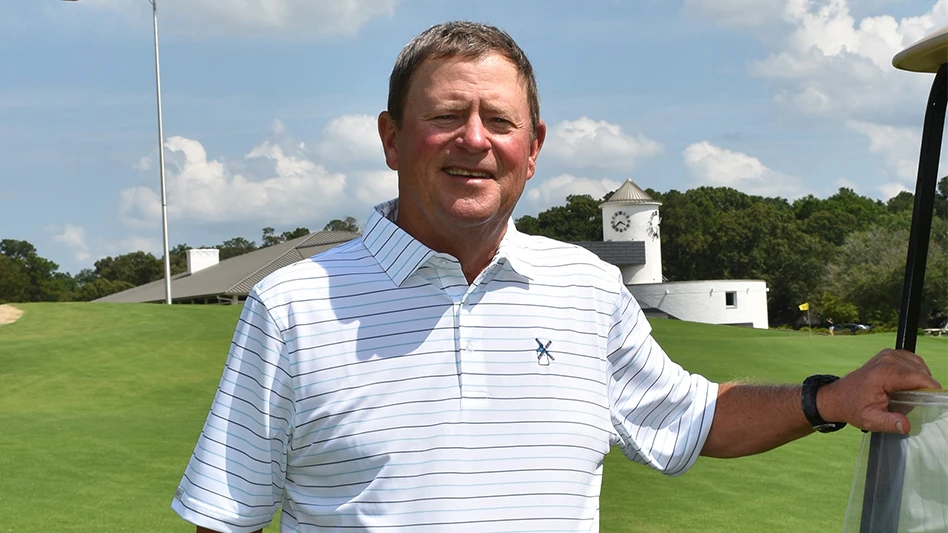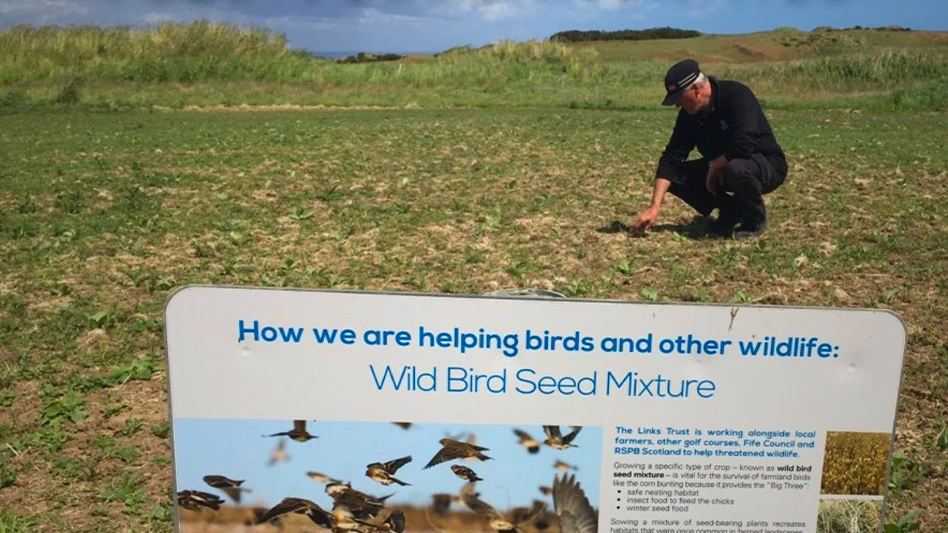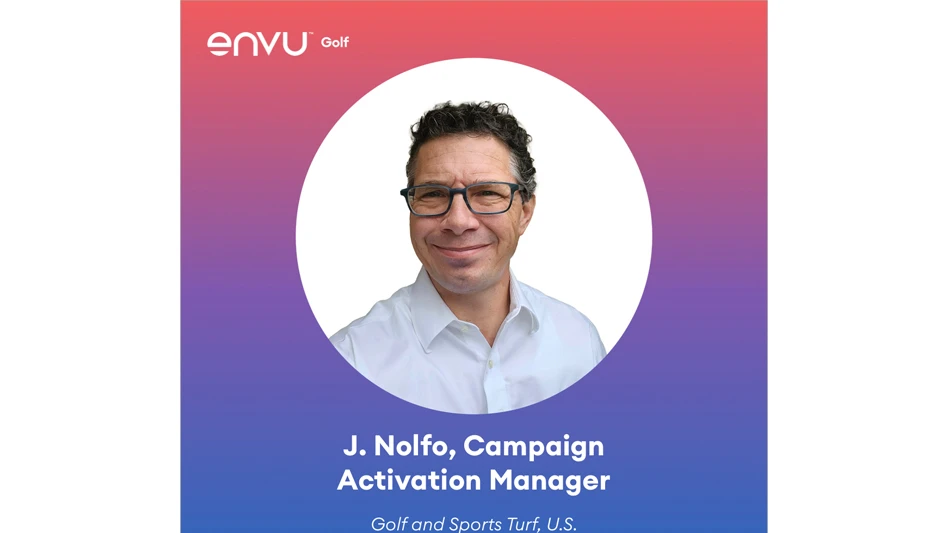GCN interviews Bland Cooper, director of agronomy for ValleyCrest Golf Course Maintenance
There is little about Bland Cooper’s career that fits his rather unique first name. He’s been a superintendent, owner, general manager, turf consultant and is now director of agronomy for Calabasa, Calif.-based ValleyCrest Golf Course Maintenance.
When he was younger, Cooper seemed destined to follow in the legal footsteps of his dad, a circuit court judge, but he also inherited the family green thumb (his great grandmother was a master gardener) and started working at courses early on. Thus, the road to law school took a sharp turn as he ended up at Horry-Georgetown Technical College’s turf program in South Carolina and, from there, jumped immediately into a wide-ranging career in golf course management.
His passion for the business is evident as he describes his career; the current state of the industry; and the good, bad and ugly of consulting and management companies.
Where the heck did you get a name like “Bland”?
It was my mother’s maiden name. The Coopers are big on family names.
How’d you get into this crazy business?
I never was passionate about anything else. My father was an attorney, so I always thought that’s what I should be. In college, I changed majors several times and took a law class one semester and realized I didn’t care for it much. I had started playing golf when I was younger and fell in love with it. I had a friend who worked at a local course and got a job there working carts. At 14, I started triplexing greens. By 16, I was sharpening reels and doing much more on the course than anyone that age would be allowed to do today. I’m most comfortable when I’m given a wide berth, and I definitely was given a wide berth. No matter what I did, I always came back to golf.
After my junior year of college, I decided to go down to Horry-Georgetown. My dad was supportive, but my mom wasn’t too sure. I went down there thinking, ‘This will probably be a semester off from school.’ But I loved it and had a lot of wonderful instructors who challenged me. After my first year at H-G, the thought of being a lawyer never crossed my mind again.
You started out as a regular superintendent. What did you learn from that?
You learn about earning the trust of others and executing your program. I enjoyed every minute of it, but I wanted to get into ownership. So I started the Sulstone Group with Sam Shumate.
What’s changed for a typical Southern superintendent during your career?
Twenty years ago, if you were able to grow bentgrass in the South, you were considered a hero. Now, it’s almost a given. It’s amazing.
You’re still young, but you’ve done a lot. What would you tell a young person who wants to get into the business now?
The one thing I’d stress to a young guy who is coming out of turf school right now is courses often hire from among well-known clubs and superintendents. That’s the route I would have gone if I had to do it again. That’s crucial to the development of your career. It’s tough to move up the ladder in this industry unless you’ve done that.
What’s the biggest mistake superintendents make?
Too many superintendents fail to continue to learn new things every day. This industry’s not getting any dumber … it’s just getting smarter. You have to continue to learn just to stay up to speed.
I know a superintendent who makes his former assistants call him every month with something new they’ve learned. That’s great.
You did double-duty as a course owner and agronomist for a while. What was that like?
It was a great learning experience. I understand the financial side of the business much better than I used to, and I have a better appreciation for marketing and revenue development. But my heart was always on the agronomic side.
Sam and I sold off the Sulstone properties to a developer in Charlotte and some other people. It was a very amicable separation. We both just wanted to go different ways.
Tell us about ValleyCrest.
I’m the director of agronomy, and I report to Terry McGuire and work with our regional superintendents. I still have a couple of consulting clients, but I’m focused on helping our superintendents and assessing new potential properties.
I’m doing a lot of the same things as a superintendent only on different properties. I spend half my time on existing properties and the other half assessing potential new clients. When you’re providing fixed-cost maintenance, you need to uncover every single stone to make sure the return on investment is there. We’re at 43 18-hole equivalents now, and we’re hoping to be at 50 soon. Half our portfolio is in California and Florida, but we’re growing throughout the country.
Why is ValleyCrest different?
The difference is that we’re specialized. We’ve made a dedicated and concerted effort to do this effectively and profitably. We’ve also hired good quality people. ValleyCrest is the largest landscape contractor in the country, and it was started by Burton Sperber out of the back of his truck more than 50 years ago. That culture permeates everything we do on the golf side as well. We’re growing in the right way … a healthy way.
ValleyCrest isn’t into golf course ownership. We’re a maintenance contracting company, so we look at courses differently. We take a hard look at a course to establish a fixed price.
We’re also able to provide much more support to our superintendents because of consultants like Ted Horton, Mike Huck and myself. We have many resources that our superintendents can use.
What are you looking for when you assess a course?
We assess a course for two or three days. Agronomically speaking, we want to align ourselves with the proper product. We want to make sure we reach a partnership with a client that wants to improve his facility, not just someone that wants to reach status quo. We’re not in the business of saving money.
What kind of problems do you encounter during assessments?
Courses that are 15 years old or older often have antiquated pump stations and bunkers that need to be replaced. We also see a lot of greens that haven’t been well-managed. It’s common to find pH issues or soil chemistry problems. We take 700 to 1,000 pictures, profile the soil of every green and tee and measure organic matter. You’re always going to find problems with the property and, more times than not, it’s not the fault of the superintendent.
Do you like it?
I get personal satisfaction out of it. I get to work companywide with our 12 regional superintendents and move around based on need.
Why do management companies have a negative reputation?
Management companies that own their own courses have to find ways to make the bottom line work to pay off their debt. In many markets today, debt coverage ratios are upside down, and that makes it impossible to service large debts and provide the resources to properly maintain the property. That’s business suicide. You’re going to fail. Also, most executives of management companies understand the revenue side of the business well but don’t understand the expense side, like golf course maintenance.
I’ve never found a correlation between spending and success. They always rely on the superintendent to squeeze an extra dollar out of the operation. They blame the effect, not the cause.
Some management companies try to solicit new business by going over the head of the superintendent. Do you guys do that?
ValleyCrest tried that once many years ago, as did many other companies. I remember getting one of those at the time and getting extremely angry. That was a long time ago. Today, it’s different. There’s been much fence-mending during the past 10 years.
Our current philosophy now – based on input from Ted Horton and others – is to take business that comes in over the transom—people who contact us – or through a superintendent we know and trust. We never go onto a property without contacting a superintendent first. We want him to be the first person who knows. We’re a company of superintendents.
What do you mean by that?
We aren’t for everybody. We’ve looked at a facility and said, ‘You know what, we can help you but only marginally.’ We can’t fix everybody or meet everybody’s needs. We never, ever reduce a superintendent’s resources when we go in. We can’t compensate for lack of resources.
We also have efficiencies because of our size. Toro has been a wonderful partner for us. And we’re self-insured on workers’ compensation. Our superintendents do 95 percent of their purchasing on their MasterCard. No purchase orders … it’s clean and fast. It’s bad business to have your highest-paid employee shuffling papers all day long.
Finally, when you reach a certain size – I think we’re the seventh largest multicourse operator – there’s a lot of ability to move internally and a lot of opportunity for training and learning. We hope that internally generates many great people. We can almost guarantee them opportunities. That’s versus a stand-alone club where the opportunities might be limited. It’s not for everybody. There are certain personalities that don’t work well within the structure. There’s a certain amount of oversight that some people aren’t comfortable with. We don’t take away the individuality.
The business seems to be going toward a more team-oriented approach, but I’m sure you still run across facilities that work in ‘silos’ where managers don’t talk much with each other.
The only industry I know that works successfully in silos is the insurance business. They don’t want information shared between departments.
As everybody’s tightened their belts in the golf industry during the past few years, it’s become critical for everyone to share information across departments. The g.m. drives that. Superintendents need to be aggressive finding out what’s going on throughout the whole facility. There are still too few superintendents and golf pros who will go out after work and have a beer and talk. Lack of communication is a recipe for disaster.
You’ve done a lot of consulting, and that can be another dirty word among superintendents. How do you respond?
Memberships don’t bring in a consultant when everything is working perfectly. The superintendent in that situation needs to meet with them right away, understand the reasons and get a handle on it. For every (consulting) horror story, there are a hundred success stories. But, unfortunately, bad things happen, so superintendents have every reason to flinch. But, perception isn’t always reality.
In some cases, the members already have made up their mind, and the consultant is just a means to an end. I consulted for a club last year where one of my best friends was the superintendent. I worked hard to get them to understand, but they still terminated him. The decision was already made.
A consultant should never go into a club where he knows the superintendent is going to get fired. It needs to be transparent. I’d never go into a club without feeling comfortable the superintendent wanted me there.
What’s next for you?
I want to keep doing exactly what I’m doing now. I have the opportunity to do just what I love to do: spend all of my time supporting superintendents and see new courses. It gives you the chance to go around and learn more and more. That rejuvenates me. Until I get burned out, it’s perfect.
My father told me if you enjoy it and you’re passionate about it, try to be the best you can be. It sounds like a line from one of those corny motivational posters, but it works for me. GCN

Explore the August 2006 Issue
Check out more from this issue and find your next story to read.
Latest from Golf Course Industry
- Making the grade — at or near grade
- PBI-Gordon receives local business honor
- Florida's Windsor takes environmental step
- GCSAA names Grassroots Ambassador Leadership Award winners
- Turf & Soil Diagnostics promotes Duane Otto to president
- Reel Turf Techs: Ben Herberger
- Brian Costello elected ASGCA president
- The Aquatrols Company story





